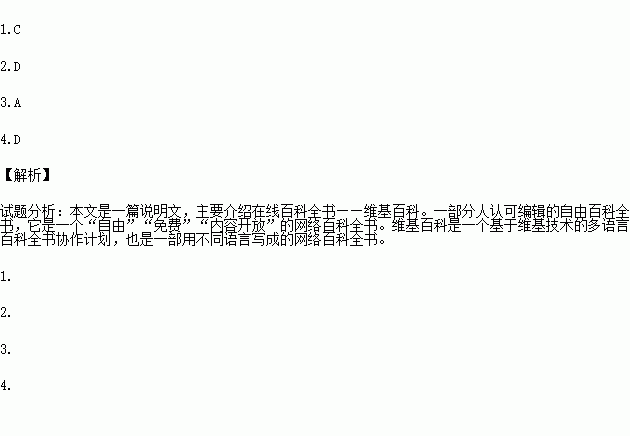题目内容
Wikipedia (维基百科) is a non-profit website funded by donations, started on 15th January, 2001. “Wiki” means “quick” in the Hawaiian language. These days, most people go straight to Wikipedia, the online encyclopedia (百科), to look something up. But how reliable is it?
The site attracts 78 million visitors every month, and it is available in more than 270 different languages. It’s one of the most comprehensive (综合的) resources available, and it’s got much more information than an ordinary encyclopedia. The site is updated on a daily basis by thousands of people around the world. Anyone with an Internet connection can look through and edit the contents or add a new page at any time. And you don’t need any formal training.
Of course, there are some controls. Wikipedia has a team of more than 1,500 administrators who check for false information. And main targets for horrible comments (such as politicians) are forbidden to public editing. But with more than 16 million articles to keep an eye on, it isn’t easy. So, while Wikipedia benefits from being constantly updated with information from all over the world, it’s also open to “vandals”(故意捣乱者).
Some of the damage is easy to notice. Someone drew horns and a moustache on Microsoft chairman Bill Gates’ photo. But other things are harder to spot. The most common form of vandalism involves adding tiny items of false information into the biography of a famous person. Unbelievably, some of this misinformation has appeared in newspapers, with The Daily Mail, The Guardian and The Independent all having fallen victim to the tricks. For example, in an obituary (讣告) for British comedian Sir Norman Wisdom, one newspaper claimed that he co-wrote Dame Vera Lynn’s wartime song “There’ll be Bluebirds over the White Cliffs of Dover”. In fact, he did no such thing.
So if you’re going to use any information from Wikipedia, make sure you double-check it first.
1.What do we know about Wikipedia?
A. It makes profits from its users.
B. It is run by the Hawaiian government.
C. It provides a huge amount of information.
D. It is the most popular website worldwide.
2.Which of the following is TRUE according to the passage?
A. 78 million people visit Wiki each day
B. To forbid wrong public editings is quite easy
C. Formal education is needed to do editing for Wifi
D. Some people change the information on Wiki just for fun
3. The example of Norman Wisdom’s obituary is used to show _________.
A. Wikipedia sometimes contains false information
B. some newspapers like The Guardian are irresponsible
C. Norman Wisdom is unpopular with some people
D. Wikipedia affects people’s lives greatly
4.What does the author advise readers to do?
A. To look through Wikipedia frequently.
B. To update Wikipedia on a daily basis.
C. To turn to other websites for valid information.
D. To be careful when using the information from Wikipedia.

